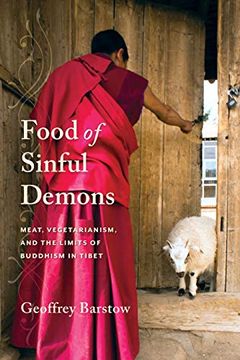Compartir
Food of Sinful Demons: Meat, Vegetarianism, and the Limits of Buddhism in Tibet (Studies of the Weatherhead East Asian Institute, Columbia University) (en Inglés)
Geoffrey Barstow (Autor)
·
Columbia University Press
· Tapa Blanda
Food of Sinful Demons: Meat, Vegetarianism, and the Limits of Buddhism in Tibet (Studies of the Weatherhead East Asian Institute, Columbia University) (en Inglés) - Geoffrey Barstow
$ 53.026
$ 88.377
Ahorras: $ 35.351
Elige la lista en la que quieres agregar tu producto o crea una nueva lista
✓ Producto agregado correctamente a la lista de deseos.
Ir a Mis Listas
Origen: Estados Unidos
(Costos de importación incluídos en el precio)
Se enviará desde nuestra bodega entre el
Martes 02 de Julio y el
Jueves 11 de Julio.
Lo recibirás en cualquier lugar de Argentina entre 1 y 3 días hábiles luego del envío.
Reseña del libro "Food of Sinful Demons: Meat, Vegetarianism, and the Limits of Buddhism in Tibet (Studies of the Weatherhead East Asian Institute, Columbia University) (en Inglés)"
Tibetan Buddhism teaches compassion toward all beings, a category that explicitly includes animals. Slaughtering animals is morally problematic at best and, at worst, completely incompatible with a religious lifestyle. Yet historically most Tibetans--both monastic and lay--have made meat a regular part of their diet. In this study of the place of vegetarianism within Tibetan religiosity, Geoffrey Barstow explores the tension between Buddhist ethics and Tibetan cultural norms to offer a novel perspective on the spiritual and social dimensions of meat eating. Food of Sinful Demons shows the centrality of vegetarianism to the cultural history of Tibet through specific ways in which nonreligious norms and ideals shaped religious beliefs and practices. Barstow offers a detailed analysis of the debates over meat eating and vegetarianism, from the first references to such a diet in the tenth century through the Chinese invasion in the 1950s. He discusses elements of Tibetan Buddhist thought--including monastic vows, the Buddhist call to compassion, and tantric antinomianism--that see meat eating as morally problematic. He then looks beyond religious attitudes to examine the cultural, economic, and environmental factors that oppose the Buddhist critique of meat, including Tibetan concepts of medicine and health, food scarcity, the display of wealth, and idealized male gender roles. Barstow argues that the issue of meat eating was influenced by a complex interplay of factors, with religious perspectives largely supporting vegetarianism while practical concerns and secular ideals pulled in the other direction. He concludes by addressing the surge in vegetarianism in contemporary Tibet in light of evolving notions of Tibetan identity and resistance against the central Chinese state. The first book to discuss this complex issue, Food of Sinful Demons is essential reading for scholars interested in Tibetan religion, history, and culture as well as global food history.

